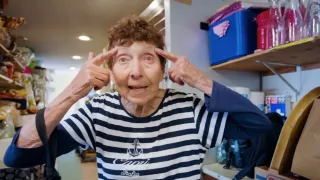June 9, 2015
'Henrietta' Brings to Life Black Women's Struggle With Medical Community
Kay Bourne READ TIME: 4 MIN.
A poor black tobacco farmer, when Henrietta Lacks fell ill, she put her faith in doctors.
She could feel the tumor in her belly growing, she could see the black burn marks on her body from the radiation spreading, but she accepted the diagnosis that her cancer of the cervix was treatable and she continued traveling some 40 miles each way to the "colored ward" of John Hopkins Hospital. She died there in excruciating pain. The year was 1951.
The doctors, however, gladly returned to their labs where the cells they'd been farming from Henrietta Lacks without her knowledge, continued to flourish, as they do to this day. Cultured by George Otto Gey, Lacks's microscopic organisms provides the first known human immortal cell line for medical research.
Scientists know these cells as Hela and they became vital for developing the polio vaccine, cloning, gene mapping, in vitro fertilization, and more. Henrietta Lack's cells have been bought and sold by the billions, yet she herself was virtually unknown, and her family unable to afford health insurance.
A story buried that is, until now.
A powerful bit of investigative reporting from Rebecca Skloot brought the ugly matter to light. Her book "The Immortal Life of Henrietta Lacks" hit the best seller list and it looks as if Oprah Winfrey will make a television drama based on the riveting story that unveils this particular chapter in the sordid history of experimentation on African Americans, as well as, the birth of bioethics, and the legal battles over whether we control the stuff we're made of.
In a new play, however, a cast of five black women and a Latina get more intimate by cutting out the "as told to" factor.
Henrietta Lacks speaks for herself in their compelling performance of "Henrietta," which recently had a workshop presentation as part of this year's Psychological Trauma Conference, held May 28 at the Seaport World Trade Center in Boston.
A second performance takes place on Sunday, June 14 at 3 pm at the Design Studio For Social Intervention, 1946 Washington St in Boston, between Shawmut and Harrison Ave.
With a fiery script by talented scribe Licia Sky (who also performs), "Henrietta" delves into the realities that make up the cultural memory black women retain as they face a visit to the doctor's office.
She has paired Henrietta Lack's miserable experience at John Hopkins with the, yes!, even more repellent story, also true, of Anarcha, an African woman in slavery in the plantation South who was repeatedly operated on without anesthesia. Her captor, Dr. J. Marion Sims, was offering Anarcha's body as an opportunity for other medical doctors as well as himself to study the female genitalia.
"Come on out," he would urge Anarcha as she hovered in a corner of her small cage like cabin, with the promise of opiates after the exam, that's right, afterwards. This son of Alabama is regarded as the "father of modern gynecology" and there is a statue in his honor in Columbia, South Carolina (which Sky commented in a Q and A ought by all rights be torn down).
The some 30 more or less roles are variously performed by only five actors, many of whom are well known to theater-goers. The tone of the drama is underscored by songs with a folk music flavor by the musician, who is the playwright as well, Licia Sky. She sings the original music accompanying herself on the guitar. "Henrietta" is her first play, which she is developing in these workshops, the first of which was at the library in Malden.
Some background to the actors, all of whom were terrifyingly believable: Cheryl D. Singleton, most recently seen as Mrs. Dickson in the Lyric Stage production of "Intimate Apparel" and Amelia Lumpkin, last seen in Company One's "Shockheaded Peter."
As well, Alexandria Danielle King, the emcee in "Shockheaded Peter" and a Theatre Arts Instructor with Company One. and Mexican resident Melissa Nussbaum Freeman, herself a playwright ("La Dona of Santa Cruz") is the Senior Intern to the Executive Director at the Theater Offensive. Freeman directed the workshop reading.
You can be a part of the evolution of this powerful drama by attending the next workshop. Audience feed-back is encouraged.
The Henrietta workshop reading is Sunday, June 14 at three pm at the Design Studio For Social Intervention, 1946 Washington St in Boston, between Shawmut and Harrison Ave. For more info please phone (617) 515-2848






